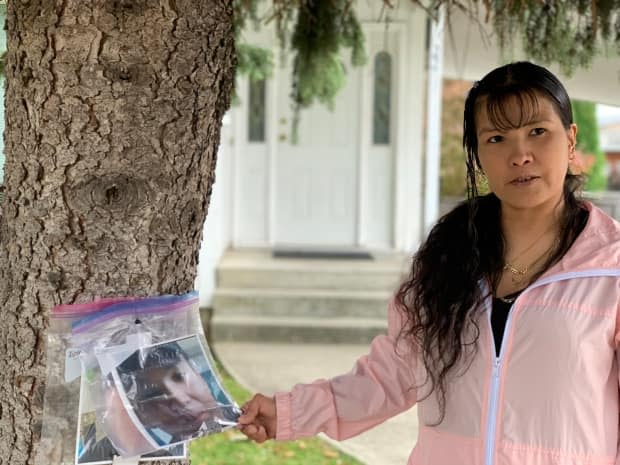Coroner's inquest hears wrenching testimony from mother of B.C. teen found dead in group home

WARNING: This story contains distressing details.
On the opening day of the coroner's inquest into the death of Cree teen Traevon Chalifoux-Desjarlais, his mother recounted her devastation and disbelief in learning his body had been found in his Abbotsford group home bedroom closet four days after an employee at the home had filed a missing person report with Abbotsford police.
"How is it they made the missing file report without knowing he was there, hanging in his group home," sobbed Samantha Chalifoux.
"They're supposed to be there to care and support children, to be there for them. So how is it that my son was hanging there for four days? Can you please answer me that?"
Chalifoux-Desjarlais, 17, was found dead in an Abbotsford group home called Ware Resource on Sept. 18, 2020. The Cree boy was living in the group home after being put into a voluntary custody arrangement by his mother.
The home was operated by Rees Family Services, a company contracted by Xyolhemeylh, also known as the Fraser Valley Aboriginal Children and Family Services Society (FVACFSS). FVACFSS is an agency funded to deliver services under the Ministry of Children and Family Development (MCFD.)
Abbotsford police and the coroner originally described the teen's death as a suicide that did not require further investigation or an autopsy. After an outcry from First Nations leaders, the coroner announced it would go ahead with an autopsy.
The nine-day inquest is scheduled to hear from close to 30 witnesses, including Ware Resource group home workers, officials from Rees Family Services, FVACFSS and the MCFD, the deputy chief of the Abbotsford Police Department and officers involved in missing persons cases.

Chalifoux was the first witness called and was supported by her mother (Traevon's grandmother), who sat behind her in the witness box wearing an orange "every child matters" T-shirt.
Under questioning from inquest counsel Steven Liu, Chalifoux recounted how Traevon was apprehended from her at birth, how he grew up in difficult circumstances moving between the homes of aunts and an uncle, and how he eventually came to live with her sometime in 2019.
Chalifoux said she put Traevon into voluntary care because his weed smoking was setting a bad example for her younger son and could lead to them getting thrown out of their housing.
She said, at first, Traevon seemed OK at the group home, but as weeks passed, she started getting more frequent calls from him expressing frustration in not being able to access clean bedding, clean clothes or enough food.
She testified on one occasion, he called her at nine or 10 at night from outside the home, claiming staff had kicked him out of the house and told him to wait outside while they went to get coffee.
Chalifoux testified that after learning her son was the subject of a missing person report, she went to the group home for four straight days and banged on the doors and windows each time, hoping Traevon had returned.
"No one answered, and yet my son was in there hanging," she said.
A coroner's inquest does not find blame or criminality but is meant to serve the public interest in revealing the facts and circumstances of a death. At its conclusion, the jury can make recommendations aimed at improving policy and procedures.
If you or someone you know is struggling, here's where to get help:
If you're worried someone you know may be at risk of suicide, you should talk to them about it, says the Canadian Association for Suicide Prevention. Here are some warning signs:
Suicidal thoughts.
Substance abuse.
Purposelessness.
Anxiety.
Feeling trapped.
Hopelessness and helplessness.
Withdrawal.
Anger.
Recklessness.

